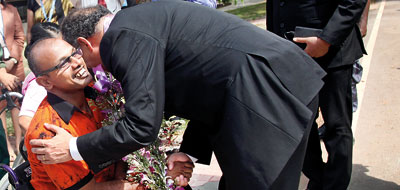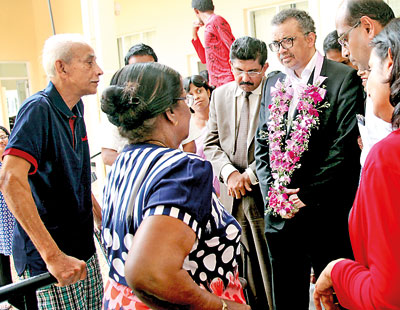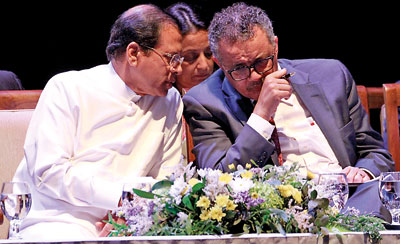News
People’s person WHO DG touches hearts at Ragama Hospital
There is purposeful activity, a tangible excitement and an air of great expectancy.

A hug from Dr. Tedros Adhanom Ghebreyesus for Sanath Kumara. Pix by Priyantha Wckramaarachchi
“I have never done this before in my life,” murmurs wheelchair-bound H.D. Kumari with a touch of trepidation, with a basket of lovely flowers on her lap, amidst a knot of people gathered under shade trees in the afternoon heat on Friday.
By her side in another wheelchair is Sanath Kumara with a beautiful garland and standing-by are several others with betel leaves nestling in their hands to greet a Very Important Person (VIP).
Suddenly a police escort vehicle with lights flashing comes down the road followed by another vehicle and out steps the VIP dispelling all doubts that this will just be another cursory and rushed ‘official’ visit amidst a tightly-packed schedule, with a greeting here, a pat on the head there, a grip and grin photograph after which he is whisked off to the next meeting.
Smilingly, greeting or hugging each and everyone he meets and stopping for long chats with men, women and children at the Rheumatology and Rehabilitation Hospital in Ragama is the Director-General of the World Health Organization (WHO), Dr. Tedros Adhanom Ghebreyesus. He is accompanied by WHO Representative to Sri Lanka, Dr. Razia Pendse and Health Services Director General Dr. Anil Jasinghe.
On a whistle-stop visit to Sri Lanka to celebrate the very first World Health Day on April 7, after his election to the topmost position of the WHO in May last year, it is straight from the airport after a flight from Geneva that he has arrived at the hospital.
And yesterday, at the celebration of the 70th birthday of the WHO — which coincides with the 70th independence anniversary of Sri Lanka – amidst a large and distinguished gathering at Nelum Pokuna, Dr. Tedros recalls his meeting with Sanath Kumara to highlight the importance of Universal Health Coverage (UHC), which means that everyone receives the health service they need without suffering financial hardship.
This is the global theme of World Health Day – Health For All, as leaders make a commitment to provide ‘UHC to Everyone, Everywhere’.
With President Maithripala Sirisena being Chief Guest at yesterday’s celebrations and a strong political endorsement for UHC by Prime Minister Ranil Wickremesinghe and Health Minister Dr. Rajitha Senaratne, Sri Lanka has secured a niche as a model.
This is why at the 142nd session of the Executive Board of the WHO, Dr. Tedros had honoured Sri Lanka by choosing this country for the celebrations of World Health Day 2018, stating that “there is no more fitting place for this event, as you know, as Sri Lanka has a long history of providing free healthcare for its people”.
On Friday, meanwhile, it is obvious that Dr. Tedros from Ethiopia is very much a people’s person and cares about them wherever they may be, as he listens to the heart-wrenching tales of everyone at the Rheumatology and Rehabilitation Hospital.
As he walks around the hospital’s Physiotherapy and Occupational Therapy Units where patients with spinal cord injuries are rehabilitated, there is much laughter, for sometimes when he puts his hands together in the traditional Sri Lankan greeting of Ayubowan, the other would extend his for a hand-shake.
Two boys seated side by side, Tharusha (9) and Janith Madushanka (14), are asked whether they are friends and when they say no, he tells them that now they will form a bond of friendship here. Dr. Tedros listens to why Janith is at this facility – for physiotherapy after surgery entailing a hamstring release and Achillies tendon elongation, while he tells 18-year-old Malisha Oshara who has lost the use of his legs after a motorcycle accident that he is handsome and to keep doing what his health staff urge him to do.
The role Dr. Tedros has been playing so far, boosting morale though is slightly reversed when 42-year-old Fatima tells him how strong she has become since coming into this hospital.

Charles Wijesuriya recalls the tragedy that befell him and his wife as Dr. Tedros Adhanom Ghebreyesus , Dr. Anil Jasinghe and Dr. Razia Pendse listen with empathy
“I have a new life and a new family here,” says Fatima who is paralyzed after a fall from a height while working in Saudi Arabia when she was in her 20s. To add to her woes, she had been abandoned by her family which considered her a burden, on her return to Sri Lanka.
As Dr. Tedros admires her spirit, she tells him how she sews her own clothes as she is now a skilled seamstress and immediately he asks her whether she can stitch a kit like she is wearing for him to buy for his wife, to which she readily agrees.
Leisurely, he poses for photographs with flower-bearer Kumari and garland-bearer Sanath Kumara and gives ear to their stories too – how Sisira and Kumari lost the use of their legs in accidents, how Sanath has secured loads of medals at sports events on display at the facility and how Kumari found her soul-mate here, another patient, and they are the proud parents of a little girl who is then promptly called to be in the photographs.
Hopping into the vehicle Dr. Tedros is next off to the Sri Lanka School of Prosthetics and Orthotics of the hospital, which serves a dual purpose – providing services to patients and training staff — a little distance away. Here too Charles Wijesuriya unburdens his heart. He and his wife who is by his side were knocked down by a car while going to the temple and both had lost their right legs. They have been fitted with prosthetics which the hospital’s workshops design and develop along with orthotics.
The clock though is ticking and more meetings await Dr. Tedros in Colombo, causing worry lines for his time-keepers. However, he lingers a little more to accept a token of appreciation and to write in the Visitors’ Book.
He is “honoured” to visit the centre. “Very much impressed by what I have seen. From my interactions with the people I could see your focus not only on the physical rehabilitation but your focus on building their confidence. I was also glad to hear that those who are getting a service here feel at home,” he comments.
As Dr. Tedros and the WHO Representative to Sri Lanka, Dr. Razia Pendse promise to support the hospital on the request of Deputy Director Dr. Dedunu Dias, it is time to bid goodbye.
The smiles of all, patients and staff, even the security personnel who rush up to him to say ’bye are proof that the memories of his visit will be cherished forever, giving hope, confidence and courage in the future.
| UHC is more than just health insurance:Dr. Tedros | |
The message which resonates loud and clear at the World Health Day celebrations is that health is a human right.  President Maithripala Sirisena in conversation with WHO Director-General Dr. Tedros Adhanom Ghebreyesus at the World Health Day celebrations yesterday at Nelum Pokuna. Pic by Indika Handuwala “No one should get sick and die just because they are poor or because they cannot access the health services they need,” says WHO DG Dr. Tedros Adhanom Ghebreyesus, adding that Universal Health Coverage (UHC) is more than just health insurance. UHC is more than just health care. It means ensuring people can get quality health services, where and when they need them, without suffering financial hardship. He states: “UHC doesn’t only improve health. It reduces poverty, creates jobs, spurs inclusive economic growth and increases gender equality. It is a political choice. It takes vision, courage and long-term thinking. But the payoff is a safer, fairer and healthier world for everyone. From Botswana to Brazil; India to Iran; Kenya to Kyrgyzstan; Thailand to Turkey; and Sri Lanka to the Solomon Islands; countries at every income level can make progress towards universal health coverage.” There is no single path to UHC, according to Dr. Tedros. All countries must find their own way, in the context of their own social, political and economic circumstances. WHO’s Regional Director for the South-East Asian Region (SEAR), Dr. Poonam Khetrapal Singh states that achieving UHC “is the way forward to a healthier, more equitable and secure region”. “The case for UHC is decisive: Health, equity, development and security. UHC’s revolutionary promise can and must be fully harnessed,” she adds. |

